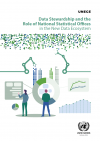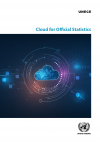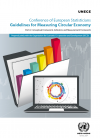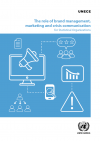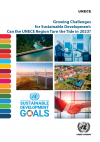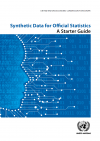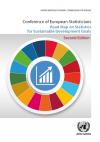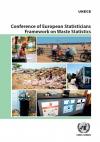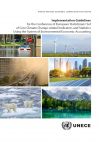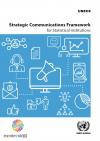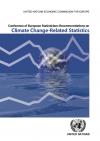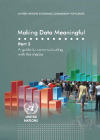Publications
Displaying Results 1 - 20 of 65
- English
The rapidly evolving landscape of data production and sharing is an opportunity for national statistical offices to reconsider their position in the national data ecosystem and take on a broader role as a provider of data services. A concept often used in association with this changing role is data stewardship. The publication defines and explains data stewardship and other related foundational
- English
The demand for timely, relevant, and trustworthy statistical insight continues to grow at an unrelenting rate. Similarly, the digital age continues to provide quantities of data which require additional processing, storage, analytical and dissemination capability.
The development of Cloud computing services has enabled greater capability in meeting increased customer demand for timely and
- English
In the past two decades, many countries and the European Union have been orienting their waste and materials management policies towards preventive and integrated approaches, with emphasis on the life-cycle and supply chains of materials and products. Policy initiatives aimed at establishing a circular economy (CE) have increased as an essential contribution to a sustainable, low carbon, resource
- English
ONLINE PUBLICATION
This publication provides the 2024 progress assessment on the Sustainable Development Goals (SDGs) in the region of the United Nations Economic Commission for Europe (UNECE), based on the data available in the United Nations Global SDG Indicators Database.
The results are presented at the regional level, identifying
- English
In the age of the information deluge, National Statistical Offices (NSOs) and International Statistical Organizations serve as vital sources of independent, reliable, and trusted Official Statistics. Amidst the proliferation of alternative data sources and global misinformation, these organizations need to highlight their contributions and the distinctive qualities that establish Official
- English
ONLINE PUBLICATION
This publication provides a progress assessment on the Sustainable Development Goals (SDGs) in the region of the United Nations Economic Commission for Europe (UNECE), based on the data available in the United Nations Global SDG Indicators Database.
The results are presented at the regional level, identifying the SDG targets that the
- English
Producers of official statistics face a complicated task in managing users’ access to the data they collect, as they must maintain the confidentiality of the individuals or businesses who have provided their data to them, while being under pressure to release ever more detailed datasets in order to provide greater analytical insight to those who wish to use such data.
Traditionally, national
- English
ONLINE PUBLICATION
This publication provides a progress assessment on the Sustainable Development Goals (SDGs) in the region of the United Nations Economic Commission for Europe (UNECE), based on the data available in the United Nations Global SDG Indicators Database.
The assessment identifies targets on which the overall progress in
- English
Machine Learning holds a great potential for statistical organisations. It can make the production of statistics more efficient by automating certain processes or assisting humans to carry out the processes. It also allows statistical organisations to use new types of data such as social media data and imagery.
Many national and international statistical organisations are exploring how machine
- English
The second edition of the Road Map on Statistics for SDGs aims to provide guidance to members of national statistical systems and other stakeholders on how to best navigate the complex task of measuring the achievement of the goals and targets of the 2030 Agenda. By doing so, it strives to strengthen reliable data-based national information systems and support efforts to achieve the Goals.
The
- English
Official waste statistics have been produced for more than 40 years. They were initially developed to monitor and manage threats to human health and the environment. More recently, information needs have shifted toward realizing the economic value of waste, particularly in the context of the “circular economy”. This change has created demand for information on waste types that have not
- English
Climate change is an existential threat and provides an immense challenge for humanity. A better understanding of all its aspects, through monitoring, modelling, analysis and reporting, is crucial to decide on the best course of action.
This document presents a set of core internationally comparable climate change-related indicators and statistics, developed by a dedicated UNECE Task Force
- English
This document provides practical guidelines on how to implement the Conference of European Statisticians’ Core Set of Climate Change-Related Indicators (CES Indicator Set), taking into account national policy priorities and data availability. It
- English
Strategic communication is a relatively new concept for most statistical organizations, which have traditionally focused their efforts and resources on dissemination practices and systems. A strategic communication function can guide the development and implementation of a communication strategy. This has particular relevance for the world of official statistics, where communication and
- English
This report provides a progress assessment on the Sustainable Development Goals (SDGs) in the region of the United Nations Economic Commission for Europe (UNECE), based on the data available in the United Nations Global SDG Indicators Database and on the statistical methodology commonly used by all five United Nations regional commissions.
The assessment identifies targets on which the overall
- English
The 2nd edition of the Road Map, published in February 2022, can be found here.
The publication provides guidance to national statistical offices on producing statistics for SDGs. It lays out what needs to be done, who are the stakeholders, and what are the opportunities for cooperation. The Road Map deals with
- English
These first ever Recommendations on Climate Change-Related Statistics are aimed at improving existing official statistics to support climate change analysis and reporting on greenhouse gas emissions under the Kyoto Protocol. The focus is not on scientific or meteorological data describing changes in weather and climate, but rather on statistics that are relevant for analysing climate change,
- English
The last two decades have seen a proliferation of methods and indicators to measure sustainable development. Many countries and organizations have adopted sustainable development indicator sets to track progress towards a sustainable society. However, the differences between the approaches remain large. Therefore, the Conference of European Statisticians set up in 2009 a joint UNECE/Eurostat/
- English
Metadata are data that define or describe other data. Metadata are essential for interpreting data and making meaningful comparisons over time and between countries. This is particularly so for reporting on Millennium Development Goal (MDG) indicators, which often have multiple data sources and typically attract a wide audience of users who may have limited background in
- English
Making Data Meaningful Part 3 - A guide to communicating with the media. Available in English (475 KB).


